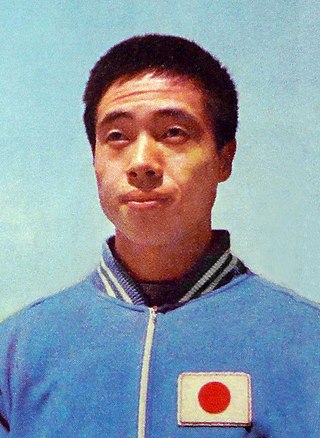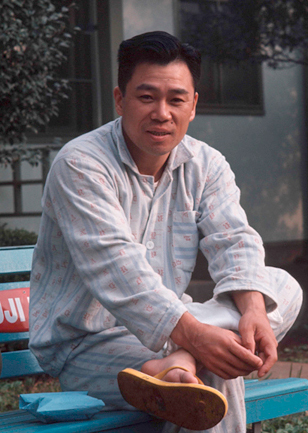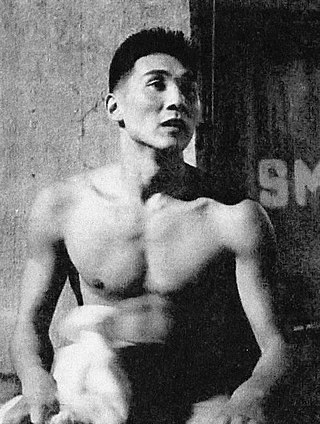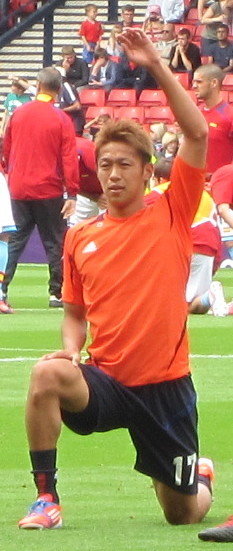
Sawao Katō is a Japanese former gymnast and one of the most successful Olympic athletes of all time. Between 1968 and 1976 he won twelve Olympic medals, including eight gold medals, making him the most successful Japanese Olympian by number of gold medals won.

Takashi Ono is a retired Japanese gymnast. He competed at the 1952, 1956, 1960 and 1964 Olympics and won five gold, four silver and four bronze medals, making him the most decorated Japanese athlete and fourth-most decorated gymnast in Olympic history by number of total medals won. Ono was the flag bearer for Japan at the 1960 Olympics, and took the Olympic Oath at the 1964 Games. In 1998, he was inducted into the International Gymnastics Hall of Fame.

Japan competed at the 1960 Summer Olympics in Rome, Italy. 162 competitors, 142 men and 20 women, took part in 96 events in 17 sports. As the country hosted the next Olympics in Tokyo, the Japanese flag was raised at the closing ceremony.
Hiroshi Yoshizawa was a Japanese ski jumper who competed in the early 1950s. He finished tied for 36th in the individual large hill event at the 1952 Winter Olympics in Oslo, and finished 13th at the 1956 Winter Olympics in Cortina d'Ampezzo.

Hiroshi Suzuki is a retired Japanese freestyle swimmer. He competed in the 100 m and 4×200 m relay events at the 1952 and 1956 Olympics and won two silver medals in 1952. In the 100 m event in the 1952 Olympics, Hiroshi actually posted an identical time to the eventual gold medal winner, Clarke Scholes of the US. Officials used a judges decision to award Clarke Scholes the gold medal and Hiroshi Suzuki the silver medal. He won gold medals in these two events at the 1954 Asian Games.

Kiyoko Ono was a Japanese politician and gymnast. She competed at the 1960 and 1964 Olympics and won a team bronze medal in 1964.
Takashi Ono is a Japanese judoka and winner of the 2005 Asian Judo Championships gold medal at the −81 kg category.

Hiroshi Kiyotake is a Japanese professional footballer who plays as an attacking midfielder or a winger for Japanese club Cerezo Osaka. He played for Japan at the 2012 Summer Olympics.
Kelita Zupancic is a judoka from Canada. Zupancic won gold medals for Canada at the 2010, 2013 and 2015 Pan Am judo championships.
Mayumi Ono is a Japanese former field hockey player who competed in the 2008 Summer Olympics.

Shohei Ono is a Japanese retired judoka.
Yusaku Ono is a Japanese male former weightlifter, who competed in the 67.5 category and represented Japan at international competitions. He won the bronze medal in the snatch at the 1970 World Weightlifting Championships lifting 125.0 kg. He participated at the 1972 Summer Olympics and at the 1976 Summer Olympics.

Hiroshi Shibata is a Japanese sprinter and triple jumper. He competed in the triple jump at the 1956 Summer Olympics and in the triple jump and the men's 4 × 100 metres relay at the 1960 Summer Olympics. After retiring, he has held a number of senior positions in athletics-related organisations, such as the Japan Association of Athletics Federations.
Ryuji Ono is a Japanese long-distance runner. He competed in the men's 10,000 metres at the 2004 Summer Olympics.
Misao Ono was a Japanese track and field athlete. He competed in the men's high jump at the 1932 Summer Olympics.
Hiroshi Tanaka was a Japanese track and field athlete. He competed in the men's high jump at the 1936 Summer Olympics.
Hiroshi Masuda was a Japanese track and field athlete. He competed in the men's pentathlon at the 1920 Summer Olympics.
Hiroshi Saito is a Japanese basketball player. He competed in the men's tournament at the 1956 Summer Olympics and the 1960 Summer Olympics.
Isao Ono is a Japanese ice hockey player. He competed in the men's tournaments at the 1960 Winter Olympics and the 1964 Winter Olympics.
The Japan men's national artistic gymnastics team is a sport group governed by Japan Gymnastics Association and represents Japan in international gymnastics competitions and multi-sports events. Followed the establishment of All Japan Gymnastics Federation in 1930, the team first appeared at the 1932 Summer Olympics and gradually became the major force till this day. For nearly two decades, from 1960 to 1978, Japanese men was dominant and won every gold medal at the Olympics and World Championships.








